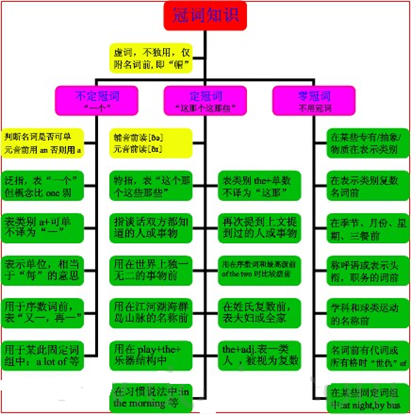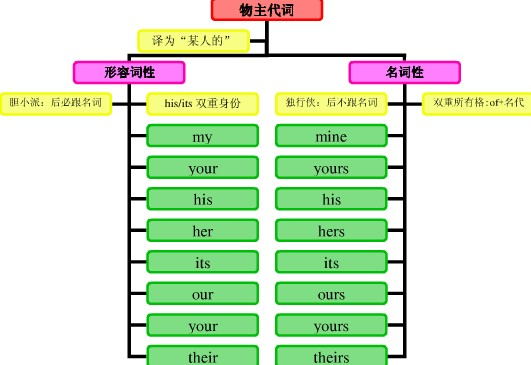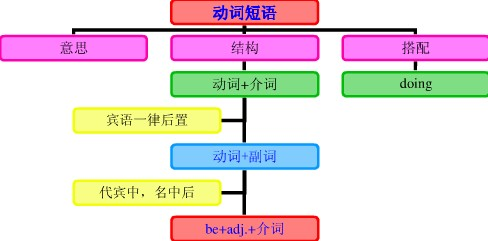本试题 “用take one's place,take the place of 或in place 的适当形式填空。(1) Mr Wu is ill. Who do you think will____?(2)It is not likely that computers will...” 主要考查您对定冠词
物主代词
介词和介词短语
动词短语
等考点的理解。关于这些考点您可以点击下面的选项卡查看详细档案。
- 定冠词
- 物主代词
- 介词和介词短语
- 动词短语
定冠词的定义:
定冠词the 有this,that,these,those等意义,但较弱,用于单数或复数名词前,主要用来特指,使一个或几个事物区别于所有其他同名的事物。
定冠词通常位于名词或名词修饰语前,但放在both、all、double、half、twice等词之后。
如:All the students in the class went out.班里所有的学生都出去了。
定冠词的用法:
1、表示特指:
如:Look! A car has stopped there. The car is beautiful. 瞧,有辆汽车在那儿停下了。那辆汽车可真漂亮。
Why not ask the teacher? 为什么不问问老师?
2、与单数可数名词连用表类别:
如:I hate the telephone. 我讨厌电话。
The cobra is dangerous. 眼镜蛇是危险的。
3、与某些形容词连用表示类别:
如:The rich are not always happier than the poor. 富人并不总是比穷人过得开心。
Theoldaremorelikelytocatchcoldthantheyoung.老年人比年轻人容易感冒。
4、用于独一无二的事物名词前:
如:The earth goes around the sun. 地球绕着太阳转。
The sky was blue and clear. 天空清澈湛蓝。
5、用于方向或方位等名词前:
如:He looked towards the east. 他朝东望。
Turn to the right at the second crossing. 在第二十字路口向右拐。
6、用于序数词或形容词的最高级前:
如:You will be the second to speak. 你第二个发言。
Autumn is the best season here. 秋季是这里最好的季节。
7、用于乐器名词前表示演奏:
如:He plays the piano very well. 他的钢琴弹得很好。
注:若不是从演奏角度来考虑,而是考虑乐器的实体,则不一定用定冠词:
He bought a piano for his son. 他为儿子买了部钢琴。
定冠词与不定冠词互换用法比较:
1、在形容词最高级前一般加定冠词。但有时却用不定冠词,这时它不表示“最”的意思,而表示“非常”“很”的意思。
如:This is the most important question of all. 这是所有问题中最重要的一个。
This is a most important question. 这时一个非常重要的问题。
2、在序数词前加定冠词,表示“第几”;加不定冠词则表示“又”“再”。
如:Will you be the firse to read the text? 你第一个读课文好吗?
Will you have a second try? 你再试一次好吗?
3、在有些短语中,用定冠词和不定冠词一样。
如:The number of our school students is about 1500. 我校学生人数约为1500人。
定冠词的用法口诀:
特指双熟悉,上文已提及;
世上独无二,序数最高级;
某些专有名,习语及乐器。
以上口诀归纳了用定冠词的一般情况,即:
①特指某些人或物
②谈话双方都熟悉的人或事
③上文已经提到的人或事
④世界上独一无二的事物前
⑤序数词回形容词最高级前
⑥某些专有名词前
⑦一些习惯短语(如:intheday等)中和乐器前(如:playtheviolin/piano)。
定冠词知识体系:

定冠词用法拓展:
1、用于姓氏的复数前,表示全家人或全家中两个或两个以上的人:
如:The Browns live next to us. 布朗一家就住在我们隔壁。
The Greens have no Children. 格林夫妇没有小孩。
2、用来代替前面已提到的人的身体部位或衣着等的一部分:
如:He hit me in the face. 他打我的脸。
He caught the thief by the collar. 他抓住小偷的衣领。
3、用于逢整十数词的复数名词前,指世纪中的年代或人的约略年岁:
如:He began to learn French in his fifties. 他五十多岁开始学习法语。
He went to Japan with his family in the sixties. 他在60年代带家人去了日本。
4、用于某些单数可数名词前,使意义抽象化,指其属性或功能等:
如:This colour is pleasant to the eye. 这颜色悦目。
He is fond of the bottle. 他喜欢喝酒。
5、表示计算单位,含有a, each, per 之类的意义:
如:He is paid by the hour (piece). 他拿计时(件)工资。
It sells at two dollars the pound. 这东西每磅卖两美元。
6、用于人名前,或特指、或比喻、或指其作品等;用于某些产品的名称前,指产品:
如:He likes the Picasso. 他喜欢毕加索的画。
Lu Xun has been known as the Gorky of China. 鲁迅人称中国的高尔基。
7、用于江、(运)河、海、洋以及山脉、群岛、半岛、海岛、海峡、沙漠等名称的前:
如:the Chang jiang River 长江
the Pacific(Ocean) 太平洋
the Suez(Canal) 苏伊士运河
①关于湖名前是否用冠词通常要分两种情况:
中国的湖名在英译时,其前通常加定冠词:
the West Lake 西湖,the Dong ting Lake洞庭湖。
而外国的湖名前,多数不加定冠词,少数加定冠词,视习惯而定:
Lake Success 成功湖,the Lake of Geneva日内瓦湖
②山名的构成有两种方式:
若用于“山名+Mountains”,其前常用定冠词:the Jing gang Mountains 井冈山;
若用于“Mount/Mt+山名”,则通常不用冠词:Mount Tai 泰山。
另外,若不出现mountain一词时,则通常要用冠词:theAlps阿尔卑斯山。
8、用于由普通名词或含有普通名词构成的专有名词 (如国名、地名、政党、团体、组织机构以及旅馆、商店、学校、医院、文娱场所、建筑物等)前:
如:the United Nations 联合国
the People's Republic of China 中华人民共和国
the National People's Congress 全国人民代表大会
注:大学名称的构成要注意以下情况:
①对于以地名命名的大学,通常有两种形式 (注意冠词的有无):
如:the University of London / London University 伦敦大学
②对于以人名命名的大学,通常只有一种表达(不用冠词):
如:Yale University 耶鲁大学
Brown University 布朗大学
物主代词的概念:
表示所有关系的代词叫物主代词。
物主代词有两种形式:一种是形容词性物主代词,在句中只能充当定语;另一种是名词性物主代词,和名词用法相同,在句中作主语、宾语、表语等。
物主代词的特性:
1、物主代词既有表示所属的作用又有指代作用。
例如:John had cut his finger;约翰割破了手指。
物主代词有形容词性(my,your等)和名词性(mine,yours等)两种,形容词性的物主代词属于限定词。
名词性的物主代词在用法上相当于省略了中心名词的“'s”属格结构,
如:Jack's cap 意为 The cap is Jack's.
His cap 意为 The cap is his.
2、名词性物主代词的句法功能:
a.作主语,例如:May I use your pen? Yours works better.
b.作宾语,例如:I love my motherland as much as you love yours.
c.作介词宾语,例如:Your should interpret what I said in my sense of the word,not in yours.
d.作主语补语,例如:The life I have is yours. It's yours. It's yours. 我的生命属于你,属于你,属于你。
物主代词的基本形式:
|
第一人称 |
第二人称 |
第三人称 | ||||
|
|
|
名词性 |
形容词性 |
名词性 |
形容词性 |
名词性 |
|
单数 |
my |
mine |
your |
yours |
his |
his |
|
复数 |
our |
ours |
your |
yours |
theirs | |
形容词性物主代词的用法:
1、形容词性物主代词通常修饰名词,作定语。
如:We should treat her mother very well.
2、与own连用表示强调。
如:I saw it with my own eyes.
名词性物主代词的用法:
1、名词性物主代词可作主语、表语和宾语。
如:This is my desk. Yours is over there.
2、名词性物主代词常用于双重属格,于of连用。
如:This girl is a friend of mine.
物主代词知识体系:

物主代词特别用法:
1、名词性和形容词性物主代词不能混用。
如:Jack has a low opinion of Sue.
2、物主代词的单复数必须和它所指代的名词一致。
如:His idea is to do more practice every day.
3、对于anyone,anybody,everyone,everybody,应根据上下文来判断his或her,有时也可用their。
如:Has everyone finished their work?
介词和介词短语的概念:
介词是一种用来表示词与词、词与句之间的关系的虚词,在句中不能单独作句子成分。介词后面一般有名词、代词或相当于名词的其他词类,短语或从句作它的宾语。介词和它的宾语构成介词词组,在句中作状语,表语,补语或介词宾语。介词可以分为时间介词、地点介词、方式介词和其他介词。
误用介词的三种情况:
1、多用介词:
多用介词可能是受汉语意思的影响将及物动词误用作不及物动词,也可能是受相关结构的影响而用错:
误:We discussed about the plan.
正:We discussed the plan. 我们讨论了计划。
误:Did he mention about the accident?
正:Did he mention the accident? 他提到那次事故了吗?
误:I saw her enter into the bank.
正:I saw her enter the bank. 我看见她进了银行。
误:He married with[to] a nurse.
正:He married a nurse. 他同一位护士结了婚。
误:How can contact with you?
正:How can contact you? 我怎么与你联系?
误:We should serve for the people heart and soul.
正:We should serve the people heart and soul. 我们应该全心全意地为人民服务。
误:Who controls over the factory? (但名词control可接over)
正:Who controls the factory? 谁管理这个工厂?
误:He has a great many of friends here. (比较a great number of)
正:He has a great many friends here. 他在这儿有很多朋友。
2、漏用介词:
漏用介词可能是受汉语意思的影响将不及物动词误用作及物动词,或是受相关结构的影响的影响而用错等:
误:This matter is difficult to deal. (deal with=处理)
正:This matter is difficult to deal with. 这事很难处理。
误:He is not a man to be depended.
正:He is not a man to be depended on. 他不是个可靠的人。
误:He took a cup of tea, and went on the story.
正:He took a cup of tea, and wentonwiththestory.他喝了一口茶,又接着讲故事。
误:My mother still regards me a child. (比较consider…as中的as可省略)
正:My mother still regards me as a child. 我母亲还把我当小孩看。
误:They insisted sending a car over to fetch us.
正:They insisted on sending a car over to fetch us.他们坚持要派车来接我们。
误:What he says is worth listening.
正:What he said is worth listening to.他的话值得一听。
3、错用介词:
错用介词的情况比较复杂,可能是因受汉语意思的而错,也可能是因弄不清搭配关系而错,可能是混淆用法而错,也可能是受相关结构的影响而错,可能是忽略语境而错,也可能是想当然的用错:
误:She called on his office yesterday. (call on+人,call at+地点)
正:She called at his office yesterday. 她昨天去了他办公室拜访。
误:He is engaged with a nurse.
正:He is engaged to a nurse.他与一位护士订了婚。
误:The sun rises from the east.
正:The sun rises in the east.太阳从东方升起。
误:Under his help, I finished it in time.
正:With his help, I finished it in time. 在他的帮助下,我及时做完了。
误:During he was in Japan, he visited many places.
正:During his stay in Japan, he visited many places.他在日本期间,参观过许多地方。
误:We are familiar to his character.
正:We are familiar with his character.我们了解他的性格。
误:Help yourself with the fruit.
正:Help yourself to the fruit.吃点水果吧。
介词的宾语:
1、名词或代词作介词宾语:
如:Are you interested in history? 你对历史感兴趣吗?
Don't worry about it. 别为它担心。
注:若是人称代词用作介词宾语,要注意用宾格。
如:No one can sing like her. 没有人能像她那样唱歌。(不能用like she)
2、动名词作介词宾语:
如:He is good at telling stories. 他善于讲故事。
In crossing the street he was run over. 他在穿过马路时被汽车撞倒。
3、过去分词作介词宾语:
如:We can't regard the matter as settled. 我们不能认为这事已经解决。
I take it for granted you have read the book. 我以为你读过这本书。
注:过去分词用作介词宾语通常只见于某些固定结构中,如上面第1句涉及regard…as(认为…是)结构,第2句涉及take sth for granted(认为某事属实)。在其他情况下,介词后通常不直接跟过去分词作宾语,若语义上需要接过去分词(表被动),可换用“being+过去分词”:
如:He went out without being seen by the others.他出去了,没有被其他人看见。
4、从句作介词宾语:
如:He was not satisfied with what she said. 他对她说的不满意。
I'm worried about where he is. 我担心他上哪儿去了。
注:介词后通常不接that从句,遇此情况需考虑用其他结构:
误:He paid no attention to that she was poor.
正:He paid no attention to the fact that she was poor. 他根本不注意她很穷这一事实。
但有个别介词(如except)可接that从句。
比较:I know nothing about him except that he lives next door./I know nothing about him except for the fact that he lives next door. 我只知道他住在隔壁,其它的就不知道了。
5、不定式作介词宾语:
如:I had no choice but to wait. 除了等,我没有别的选择。
He wanted nothing but to stay there. 他只想留在那儿。
They did nothing but complain. 他们老是一个劲地抱怨。
He never did anything but watch TV. 除了看电视,他从不干任何事。
注:(1)介词后接不定式的情形通常只见于but, except等极个别个词。该不定式有时带to,有时不带to,其区别是:若其前出现了动词do,其后的不定式通常不带to;
若其前没有出现动词do,则其后的不定式通常带to。
(2)介词后虽然通常不直接跟不定式作宾语,但却可接“连接代词(副词)+不定式”结构:
如:He gave me some advice on how to do it. 对于如何做这事他给我提了些建议。
6、形容词作介词宾语:
如:Her pronunciation is far from perfect. 她的语音远不是完美的。
In short, we must be prepared. 总而言之,我们要有准备。
Things have gone from bad to worse. 事情越来越糟。
注:(1)有些形容词用作介词宾语可视为其前省略了动名词being:
如:He regarded the situationas(being) serious. 他认为形势严重。
His work is far from(being) satisfactory. 他的工作丝毫不令人满意。
(2)有些“介词+形容词”的结构已构成固定搭配:in full全部地,全面地,无省略地; in private私下地,秘密地; in particular特别地;in general一般地,通常地,概括地; in brief 简言之;in short总之,简言之; in vain徒然地,徒劳无益地;for fee免费地,无偿地; for certain肯定地,确切地;for sure肯定地,确切地; for short为了简短,简称;atl arge自由自在地,逍遥法外; by far…得多
7、副词作介词宾语:
如:I can't stay for long. 我不能久呆。
It's too hot in here. 这里面太热了。
I looked every where except there. 除了那儿,我到处都看过了。
8、数词作介词宾语:
如:The city has a population of four million. 这座城市有四百万人口。
He was among the first to arrive. 他是第一批到的。
9、介词短语作介词宾语:
如:Choose a book from among these. 从这些书中选一本吧。
I saw her from across the street. 我从街的对面望见了她。
注:通常可后接介词短语作宾语的介词是from, till, until, since, except, instead of等。
比较:I took it from the bed. 我从床那儿(或床上)拿的。
I took it from under the bed. 我从床下拿的。
10、复合结构用作介词宾语:
如:She had no objection to Mary marrying him. 她不反对玛丽与他结婚。
She came in with a book in her hand. 她手里拿着一本书走了进来。
All the afternoon he worked with the door locked. 整个下午他都锁着门在房里工作。
介词短语的句法功能:
1、表语:
如:He was with a friend. 他和一个朋友在一起。
Health is above wealth. 健康胜过财富。
This knife is for cutting bread. 这把小刀是用于切面包的。
注:有些介词(如because of)引出的短语通常只用作状语,不用作表语:
误:His absence is because of the rain.
正:His absence is due to the rain. 他因雨未来。
但是,若主语是代词(不是名词),becauseof引出的短语可用作表语:
如:It is because of hard work. 那是因为辛苦工作的原因。
2、状语:
如:Don't touch it with your hands. 别用手去摸它。
Did you do this by design or by accident? 你这样做是有意的还是无意的?
3、定语:
如:This is his reply to your letter. 这是他给你的回信。
This is the best way of doing it. 这是做此事最好的方法。
My love for you is deeper than the sea. 我对你的爱比海深。
4、宾语补足语:
如:I found everythingin good condition. 我发现一切正常。
Her illness kept her in bed for a week. 她因生病在床上躺了一星期。
注:用作宾语补足语的介词短语在相应的被动语态中则为主语补足语:
如:He was regarded as a hero. 他被看成是英雄。
5、宾语:
如:A man stepped out from behind the wall. 一个人从墙后走出来。
He cannot spare anytime except on Sunday. 除星期日外,他抽不出时间。
6、主语:
如:Between6 and 7 suits me. 六点到七点对我比较适合。
After the exams is the time to relax. 考试后是轻松一下的时间。
注:介词短语通常不用作主语,尽管有时也像上面这样用作主语,但通常可视为是在一定的上下文中有所省略:
如:—When are we going to have the next meeting? 我们下次什么时候见面?
—On Tuesday may be convenient. 星期二可能比较方便。
此句中onTuesday虽用作主语,但可视为是其前省略了meeting一词:
即:Meeting during the vacation may be convenient.
动词短语的概念:
动词常和某些其他词类用在一起,构成固定词组,形成所谓短语动词(phrasalverb)。和动词一样,短语动词也可分为及物和不及物两种。短语动词可以作为一个整体看待,同一般动词一样使用。
动词短语的搭配类型:
1)动词+介词:这类短语动词用作及物动词,后面须跟宾语。
如:The small boy insisted on going with his parents. 那男孩坚持要跟父母一起去。
Do you often listen to broadcasts in English? 你常听英语广播吗?
Look at the children. Aren't they lovely? 看着这些孩子们。他们多么可爱呀!
We stand for self-reliance. 我们是主张自力更生的。
这一类的短语动词还有很多,如depend on(upon)(依靠),wait on(服侍),look for(寻找),deal with(对待),look after(照料),wait for(等待)等。
2)动词+副词:
这类短语动词有的用作及物动词,有的用作不及物动词。
如:I always get up as soon as the bell rings. 我总是一打铃就起床。(不及物)
Look out, there's a car coming! 当心,来汽车了!(不及物)
Have you handed in your exercises already? 你已经交练习了吗?(及物)
Please don't forget to put on your coat, it's cold outside. 请不要忘记穿外衣,外面很冷。(及物)
这一类的短语动词还有很多,及物如put out(扑灭),eat up(吃光),put down(放下);不及物如set off(出发),come up(走近),go on(继续)。
注:"动词+副词"这类短语动词和上面第一类"动词+介词"的不同之处在于:"动词+介词"用作及物动词,后面须跟宾语。"动词+副词"则有的及物,有的不及物;用作及物动词而宾语为人称代词或自身代词时,副词往往放在宾语之后。
如:Please wake me up at five tomorrow. 请在明天早上五点唤醒我。
If you have done your exercises, please hand them in. 如果你们练习做完了请交来。
She doesn't normally behave like that, she's putting it on. 她通常并不如此表现,她是装出来的。
注:这类短语动词有不少可兼作及物和不及物动词用。
如:He took off his hat when he entered the office. 他进办公室后脱下帽子。(及物)
The plane took off at seven sharp. 飞机在七点整起飞。(不及物)
Charlie rang up Neil to ask about the time of the meeting. 查理打电话给尼尔问开会的时间。(及物)
If you can't come, please ring up and let us know. 你如来不了,请来电话告诉我们一声。(不及物)
3)动词+副词+介词:
"动词+副词"之后有的可以再加一个介词,形成另一种短语动词。这类短语动词用作及物动词。
如:Do not give up hope. We must go on with the experiment 不要失望。我们必须继续试验。(go on with继续)
He came up to me. 他走到我跟前。(come up to走近)
这类短语动词还有:look down upon(看不起),do away with(去掉),put up with(忍受)等。
4)动词+名词+介词:
这类短语动词也是及物的。
如:He shook hands with all the guests at the banquet. 他在宴会上和宾客一一握手。
Young pioneers often come to the Children's Palace to take part in after school activities.少先队员经常到少年宫来参加课外活动。
Pay attention to the temperature of the stored rice. 注意仓库里的稻谷的温度。
Her job is taking care of the babies. 她的工作是照顾婴儿。
这一类短语动词还有:put an end to(结束),take notice of(注意),catch hold of(抓住),lose sight of(看不见),make use of(利用)等。
动词短语知识体系:

与“用take one's place,take the place of 或in place 的适当形...”考查相似的试题有:
- I’m going to buy a watch as _______ gift to my daughter, ______ one looking nice but not expensive.A.a, theB.a, /C...
- All the candidates were ________ the street to be named after a great man ________ his greatcontributions to the city...
- The old dictionary is still some use to us.A.ofB.withC.inD.on
- I’m beginning to regret that I ______ the job, for I’m working overtime every evening.A.take onB.take downC.take ...
- .Just as I was leaving the classroom, it ________ to me that I forgot to turn the lights off.A.happenedB.occurredC...
- —Does the film _____ you?—Yes. I’ve been hooked deeply.A.appeal toB.care aboutC.build onD.result from
- ---What about the new medicine for you?---The medicine_______. I’m better now.A.doesB.actsC.worksD.wonders
- Susan,it is your turn to____ the dining hall today.[ ]A. sweep offB. sweep awayC. sweep outD. sweep aside
- I canrideyouto the marketinmy car.A B C D
- Wang Hong is considered ___ one of the best students in our grade.A.beingB.to beC.isD.be